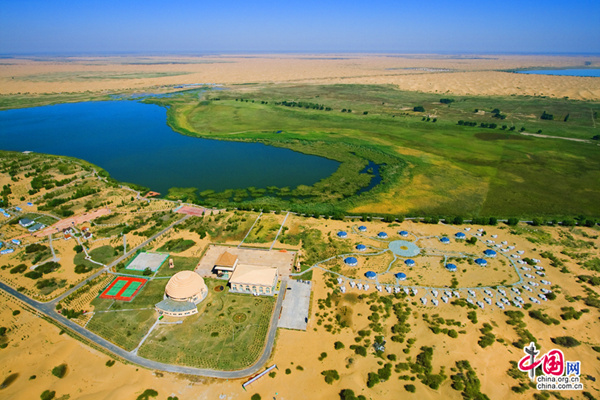Elion's greening model goes global
china.org.cn / chinagate.cn by He Shan, July 31, 2015 Adjust font size:
 |
|
Elion Resources Group has spent the past 27 years combating desertification in the Kubuqi Desert and turned more than 6,000 square kilometers of the desert into an oasis. [File photo] |
Elion Resources Group has spent the past 27 years combating desertification in the Kubuqi Desert and turned more than 6,000 square kilometers of the desert into an oasis, setting a good example for global desertification control.
"Their experiences are interesting not only because they have succeeded, but because they are done with means that any poor country can do," said Monique Barbut, Executive Secretary-General of the United Nations Convention to Combat Desertification.
She further explained that the means are mainly labor intensive. "It means what is been done here is very much replicable," she added.
Elion's greening ambition goes beyond Kubuqi and even China.
Elion has partnered with the Secretariat of the United Nations Convention to Combat Desertification to launch the greening Silk Road Partnership program in 2014, aiming to unite business and partners around the world to plant 1.3 billion trees along the Silk Road in 10 years and create a good ecological environment for the construction of the Silk Road Economic Belt.
Based on the projection of planting 1,000 trees in every hectare, 1.3 billion trees can turn 130,000 hectares of deserts into oases and contribute to carbon reduction.
With 23 countries with complicated situations involved in the grand project, the grand project faces big challenges.
"If you look at these 23 countries on the Silk Road, some of them are in the disastous state of land degradation," said Barbut.
She pointed out that the challenge is about how the governments put such an initiative into place.
Despite the difficulties ahead, Barbut stressed that the initiative is the best way for China to help others adapt to climate change.
Desertification poses major environmental and ecological threats to about one third of the Earth, according to a 2004 United Nations study. China hopes to stop the spread of the Kubuqi Desert by growing a great wall of trees.
Barbut spoke highly of the achievements and successes made by Elion in restoring an area of more than 600,000 hectares of desert to green land through a sustainable business model over a span of 27 years.
The program focuses on actively improving the ecological environment of ecologically vulnerable regions along the Belt, enhancing their ability to adapt and respond to climate change and effectively combating land degradation.
Food shortages and water scarcity have made the land issue very acute and alarming.
According to the UN, approximately 12 million hectares of productive land are being lost every year, equivalent to one tenth of the area of China. This is contributing to food shortages and water scarcity, and undermining resilience to climate change.